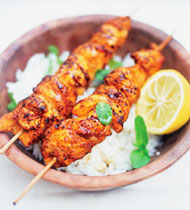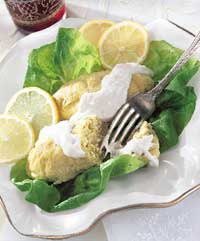 My boyfriend was a Persian Muslim. We spent a decade together starting in the mid-eighties. Neither of us came from a religiously bservant household so our typical couple problems had less to do with religion and more to do with conflicts you would expect when an open-minded, American, risk-taking former hippie (me) hung with a hard-headed (yet remarkably open-minded) Persian muslim educated in Italy (him). The sharing of food was a large part of our learning about each other.
My boyfriend was a Persian Muslim. We spent a decade together starting in the mid-eighties. Neither of us came from a religiously bservant household so our typical couple problems had less to do with religion and more to do with conflicts you would expect when an open-minded, American, risk-taking former hippie (me) hung with a hard-headed (yet remarkably open-minded) Persian muslim educated in Italy (him). The sharing of food was a large part of our learning about each other.
I helped him negotiate his first experience of the American menu with its infinite choices. You know the kind – Soup or Salad? What kind of dressing? Which of four entrée choices? Which dessert? The American way of eating was complicated to him. Sometimes the consternation I saw on his face confronting what should be such a simple task just slayed me.
We shared a mutual language in Italian cuisine. And, of course, I cooked. But until I met this man I had never had Persian food. This was at the very beginning of what was to be the huge emigration of hundreds of thousands of Persians to southern California. A Persian restaurant on every corner of Westwood hadn't happened yet. So he started my introduction to his culture with trips to Shamshiri in Hollywood. We were seated and the first thing to be put on our table was a whole peeled onion. I looked at him and started laughing. This was going to be my kind of food.
 Hundreds of plates heaped with Basmati rice and kebabs later I was ready for deeper cultural contact. I was to meet his family and join them for a meal. I am an only child of a single parent. Visits to my Mom's house were quiet and contained. His family had basically escaped through the desert carrying what they could with them. Living in a small apartment were his mother and father, his sister, her husband and their two small children.
Hundreds of plates heaped with Basmati rice and kebabs later I was ready for deeper cultural contact. I was to meet his family and join them for a meal. I am an only child of a single parent. Visits to my Mom's house were quiet and contained. His family had basically escaped through the desert carrying what they could with them. Living in a small apartment were his mother and father, his sister, her husband and their two small children.
It was crowded and loud. The smell of rice and butter permeated the air. They ate on the floor. It turned out that his mother cooked like an angel. Even now I've never had any Persian food like hers. It was essential and deeply flavorful and so satisfying that I quickly developed cravings for strange homey foods like Halim which is like a cinnamon spiced sweet wheat porridge with turkey. It was an addiction.
So years went by, the families came to an uneasy cultural truce, which was occasionally brokered with food. Eventually my mother said the sentence I dreaded. "We should have them over for Passover. "
 "Gefulte Fish?" I asked.
"Gefulte Fish?" I asked.
"Absolutely," she answered.
"But Mom I can make Algerian fish croquettes or Venetian Pesce in Carpione which they'll like and understand so much better," I think I whined.
She replied, "No! If we have them over we have to share our traditional meal."
I felt a sinking feeling in the pit of my stomach. So we invited people and started creating menus. She was the field marshal and I, her lowly gofer. Any type of menu détente I tried to slip past her was quickly detected and rejected. She became unbending and arcane. She was out to prove a point. (Which I've yet to figure out, but that's another conversation). So the table was set for 30.
Ten Americans and twenty Persians. She felt outnumbered.
Everyone came in holiday finery bearing gifts. No one was allowed to help which made the invited women feel completely out of place. They were accustomed to always lending a hand but instead had been exiled from the room they knew the best. We sat and began. Thirty plates of beautifully decorated gefulte fish went out to the table. Twenty plates of gefulte fish came back. The silence was deafening.
My mother didn't know that the day before I made Pesce in Carpione which I kept hidden in the kitchen. I quickly plated it and sent it out. It was an international hit. The evening was saved.
Pesce in Carpione is a sauteed white fish which is drenched with copious slow cooked onions and a pungent vinaigrette. It marinates overnight and is served at room temperature. It has a yielding texture and lively sweet and sour flavor. I've served it at the Angeli Passover dinners for 23 years. Here is the recipe.
Pesce in Carpione
Marinated White Fish with Caramelized Onions and Pine Nuts
Serves 4
2 pounds whitefish fillet, skin on
Matzo meal for dredging
Salt and freshly ground black pepper to taste
Vegetable oil for pan frying
1½ cups extra virgin olive oil
2 medium onions, peeled, cut in half and thinly sliced
Small handful of coarsely chopped fresh Italian parsley
1/3 cup champagne vinegar
1 teaspoon Dijon mustard
1 shallot, peeled and minced
Grated zest of 1 lemon
1 head radicchio or butter lettuce
1/4 cup lightly toasted pine nuts
Remove the pin bones from the fish using tweezers, pliers, or your fingers or ask your fishmonger to do it. Cut the fish fillet crosswise into pieces about 1/1/2 inches wide. Place the matzo meal in a shallow dish and season with salt and pepper. In a large nonstick skillet, heat about 1/2 inch of vegetable oil until hot but not smoking. Lightly dust the fish with the seasoned meal, add to the pan, and fry until golden. Carefully remove the fish from the skillet and arrange it in a non reactive baking pan of stainless, glass, or enamel
In a medium skillet, heat 1/4 cup of the olive oil and saute the onions over low heat until very tender and nearly caramelized. Season the onions with salt and pepper to taste. Arrange the onions and chopped parsley over the fish.
To make the marinade, in a small bowl whisk together the remaining 1 cup of olive oil, vinegar, mustard, shallot, lemon zest and salt and pepper to taste. Pour over the fish and let it marinate in the refrigerator for at least 24 hours, and up to three days.
Separate the radicchio or butter lettuce head into individual leaves, and arrange on serving plates. Lift the fish, topped with the onion mixture, out of the marinade and arrange on the lettuce leaves.
Garnish with pine nuts.
Evan Kleiman is chef owner of Angeli Caffe, co-author of the classic cookbooks Cucina Fresca, Pasta Fresca and Cucina Rustica and host of Good Food, a radio show which airs on KCRW 89.9fm in Southern California. Good Food Website

